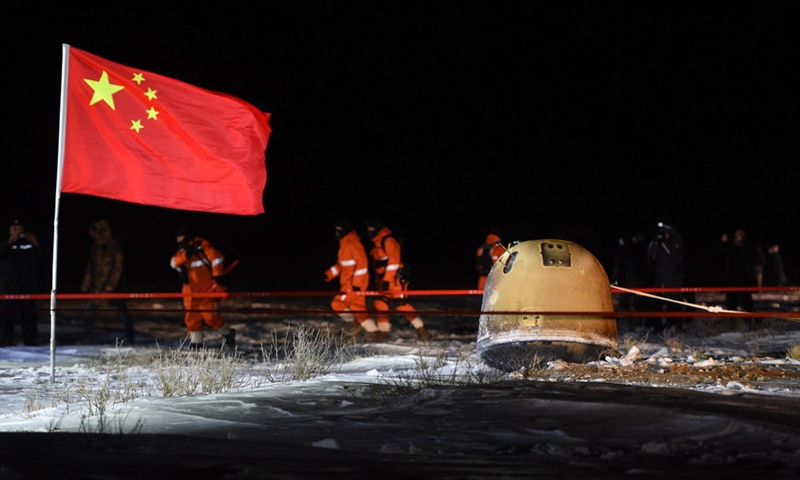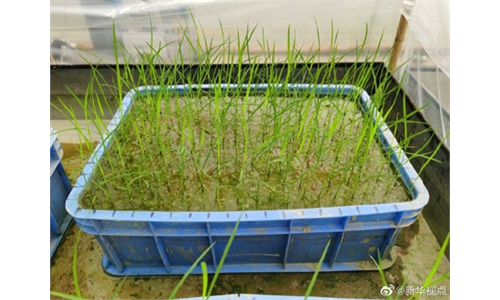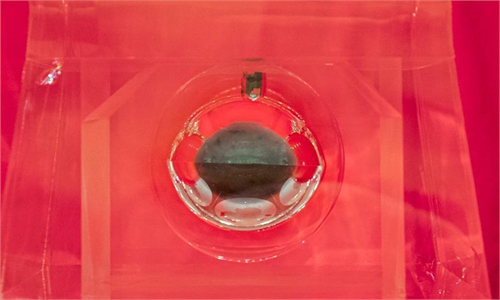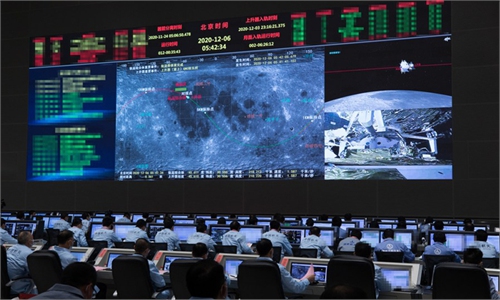
The return capsule of China's Chang'e-5 probe lands in Siziwang Banner, north China's Inner Mongolia Autonomous Region, on Dec. 17, 2020. Photo: Xinhua
China's first batch of rice seeds that traveled 23 days in space on the Chang'e-5 lunar probe in November 2020 have begun yielding grain, which experts said will enrich China's grain varieties and safeguard the country's food security, and also lay grounds for future manned deep-space explorations to the moon, Mars and other celestial bodies.
After over four months of growth, the dropping ears of the 2,000 "space rice plants" at the space breeding research center of the South China Agricultural University in South China's Guangdong Province promise a fruitful harvest, as researchers bagged the seeds that are each 1 centimeter long into three large parcels, China Media Group reported on Sunday.
The best seeds will be bred in laboratories and later planted in fields, which are expected to offer new varieties of rice that would boost China's grain harvest and enhance the breeding industry's efficiency, said Guo Tao, deputy director at the research center, according to the China Media Group's report.
The topic generated heated discussion among Chinese netizens, who wondered when the "rice from heaven" will land on their dinner tables. In response, Guo said it would still take three to four years before the rice enters the market.
"It will take a few more generations and go through a series of tests, comparisons and regional trials before passing provincial- and state-level reviews," Xu Lei, a rice breeding expert based in one of China's major rice production fields of Panjin, Northeast China's Liaoning Province, told the Global Times on Sunday.
He noted that only high-yielding, high-quality varieties that prove to be resistant to diseases would be officially recognized as stable varieties that could be promoted nationwide.
The space seeds can also contribute to China's hybrid rice breeding, Guo said. By applying the space breeding technology to super hybrid rice, the seeds can provide more and better genetic sources to expand the seed bank.
Space breeding has always been an unrelenting passion for scientists around the world to study the influence of cosmic rays, and a vacuum, microgravity space environment on organisms from the Earth, Wang Ya'nan, a space analyst and chief editor of Beijing-based Aerospace Knowledge magazine, told the Global Times on Sunday.
With the Chang'e-5 lunar probe, rice seeds have traveled into deep space, where a wider range of challenges adds to the complexity of space breeding - but where the process also produces more significant genetic effects that enhance people's understanding of life science in space, experts noted.
Such technology in China will not be limited to carrying seeds, Wang added, but it could also lead to planting in space for longer terms when China's space station starts to operate.
"With long-term human stays at the space station, researchers are hoping to conduct experiments to test a self-recycling ecosystem in space, which will greatly cut costs and reduce the resources needed for future manned spaceflights. This will support more deep-space explorations, including the building of a lunar research base and manned missions to Mars," Wang said.



